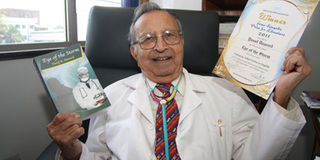In journalism, self-plagiarism is considered a form of misconduct

Dr Yusuf Dawood displays his book "Eye of the Storm" during a past interview with Sunday Nation. A reader of Dr Dawood's long-running Surgeon’s Diary, in the Sunday Nation had said he had noted repetitions of a few editions (with minor alterations in context) and wondered whether it was deliberate or whether the incidences were genuinely recited without realising that they were narrated before. PHOTO | FILE |
What you need to know:
- Self-plagiarism is taking a work you have done previously and presenting it as new or original. Plagiarism is typically defined as stealing the work of another and presenting it as if it were one’s own.
- In self-plagiarism you pass off your own work, which has been published, as new and original.
- Using material from an old story disguised as new is a form of plagiarism, which is unethical and in some cases may have implications for the copyright law.
The long-running Surgeon’s Diary by Yusuf Dawood, published in the Sunday Nation, is a great column, says Daniel Njaga, a travel consultant. He has been reading the diaries for the past 20 years without fail.
“However, over the last one year, I have noticed that he repeats past episodes - only given different headlines and little change in context.
"I really get irritated reading such a story only to find recycled stuff from past editions. I don’t know whether he does this deliberately or not. Maybe you can ask him or his editor. It’s annoying and boring.”
I responded by saying that if the surgeon has been repeating stories that is okay if he warns the reader about it. But that was not the case.
“The problems with the ones I have mentioned is that they are always disguised as new stuff, with very minor alterations in some details.”
In other words, Dr Dawood was indulging in self-plagiarism, considered in journalistic and scholarly circles as misconduct.
Using material from an old story disguised as new is a form of plagiarism, which is unethical and in some cases may have implications for the copyright law.
Imagine a writer who sells an article to one publication and then later uses the same material for another publication. That could infringe the copyright of the first publication.
SELF-PLAGIARISM
Or a university senior lecturer who, in pursuit of promotion as a professor, writes a paper for an academic journal, then later presents the same paper to a conference as new and original work so as to increase his number of publications to be considered for his promotion. In both cases it is fraud, otherwise known as self-plagiarism.
Self-plagiarism is about misleading your readers or audience about your works. This could be explicit or implicit.
It is taking a work you have done previously and presenting it as new or original. Plagiarism is typically defined as stealing the work of another and presenting it as if it were one’s own.
In self-plagiarism you pass off your own work, which has been published, as new and original.
Dr Dawood has been writing the Surgeon’s Diary longer than I can remember.
When I first joined the Nation in the 1970s he was still writing the column.
Where could I begin to check to confirm that he re-uses and re-cycles his stories even before I could ask him why?
I did not want to ask him why he self-plagiarises before I was sure he does. It would be like asking somebody why he steals before you are sure he steals.
But going through the mountains of the Surgeon’s Diary to find out the self-plagiarised episodes was pretty much like looking for a needle in a haystack.
So I asked Mr Njaga to send me the titles of those he had read and thought were recycled. But that was not of much help.
He did not keep the papers, though he could remember some of the content verbatim. I gave up the search. But Mr Njaga did not. He sent off the following message to Dr Dawood:
“Every time I read Surgeon’s Diary I just wish I became a surgeon! You make surgery sound so interesting and intellectually stimulating I almost get jealous that I missed the career.
"No other writer has endeared me to his/her career as you have done with the diary.
"I have noted repetitions of a few editions (with minor alterations in context) and I have always wondered whether it is deliberate or you genuinely recite the incidences without realising that you have narrated them before. Thanks and best wishes. Daniel.”
Then came the reply: “Many thanks for your kind words. You are a very discerning reader because I do very occasionally repeat the gist of a story because it is topical at the time or it invoked a great and popular public response when it was first published.
"Please keep reading and I promise to keep writing! Best wishes. Daktari.”
Send your complaints to [email protected]. Call 3288000, mobile 0721989264





